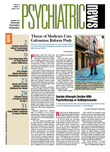For some time now, psychiatric scientists have been making forays into the nether world of bereavement, and their efforts seem to be leading to some clarification of what grief for a loved one is and what it is not.
Normal grief for a loved one, for example, does not seem to be the same as complicated or traumatic grief. The latter is characterized by persistent difficulty in accepting the death, recurrent pangs of intense grief, preoccupation with thoughts and images of the deceased, and avoidance of reminders of the loss (Psychiatric News, July 6, 2005; April 6).
Also, the depression stemming from complicated grief does not seem to be the same as major depression.
On the other hand, depression stemming from normal grief seems to be very closely related to major depression, two psychiatrists now conclude. Sidney Zisook, M.D., a professor of psychiatry at the University of California at San Diego, and Kenneth Kendler, M.D., a professor of psychiatry and human genetics at Virginia Commonwealth University, presented data backing their theory in the June Psychological Medicine.
Zisook and Kendler searched all English-language reports in Medline up to November 2006 to identify published data about key characteristics that define bereavement depression and standard major depression. They then compared characteristics for both types of depression.
Several of their results indicated that bereavement depression might be a separate disorder from major depression. For example, although women are more vulnerable to major depression, men may be equally as vulnerable to bereavement depression.
Most of their analysis, however, suggested that bereavement depression is closely related to major depression. For instance, bereavement depression, like major depression, is more common in younger adults than in older ones, more likely to occur in individuals with a personal or family history of major depression, more likely to occur in persons in poor health than in good health, and more likely to occur in those with little social support.
Furthermore, both bereavement depression and major depression are accompanied by heightened adrenocortical activity, impaired immune responses, and sleep disturbances. And bereavement depression has clinical characteristics similar to those of major depression—impaired psychosocial function, comorbidity with a number of anxiety disorders, and symptoms of worthlessness and suicidality.
“Overall, the prevailing evidence more strongly supports similarities than differences between bereavement-related depression and standard major depression,” Zisook and Kendler concluded.
These findings have important clinical implications, Zisook and Kendler believe. For example, DSM-IV-TR guidelines for diagnosing depression indicate that bereavement depression can only be diagnosed as major depression if it exceeds two months or if specific symptoms, such as suicidal ideation, morbid preoccupation with worthlessness, or psychomotor retardation, are present. Yet if bereavement depression is the same as major depression these guidelines may be invalid.
On the other hand, if depression following the death of a loved one should be largely excluded from the definition of major depression, then should depression following other types of losses, say a divorce or bankruptcy, also be excluded from it? Currently, “DSM-IV-TR singles out bereavement as the only stressful life event that excludes the diagnosis of major depressive episode when all other features are present,” Zisook and Kendler noted.
“The ideal study to test the validity of the bereavement exclusion,” they pointed out, “would compare individuals with depressive syndromes beginning within two months of the loss of a loved one...[to individuals with] major depressive episodes of similar duration and symptom profile whose onset is unrelated to the death of a loved one.” But “Unfortunately, we found no such studies in the literature,” they said.
What about treatment? “The ultimate decision of when, whether, and how to treat the depression,” Zisook told Psychiatric News,“ should be made on the basis of considerations generally used for other, nonbereavement-related depressions, such as past history of depression and response to treatment, severity and chronicity of the episode, comorbidity, anxiety level, suicidal ideation, effects on functioning, supports, et cetera. The decision should not be based on time since the death of a loved one.”
Zisook and Kendler's review was not supported by outside funding.
